Chalk it up to life under the Colorado sun—and the busyness of raising a toddler—but my skin is starting to take a hit. And let’s face it: we all want to age gracefully. Inevitably, prioritizing my skin’s health has become a non-negotiable. But in many ways, healthy, radiant skin is a product of what’s happening beneath the surface. Diet and lifestyle play significant roles. From quality sleep and moderate exercise, to eating anti-aging foods, consistent habits are key to an outward glow. Today, we’re talking all-things skin. How does poor diet affect your skin? And, what are the best foods to eat for glowing skin? Time to tap in.
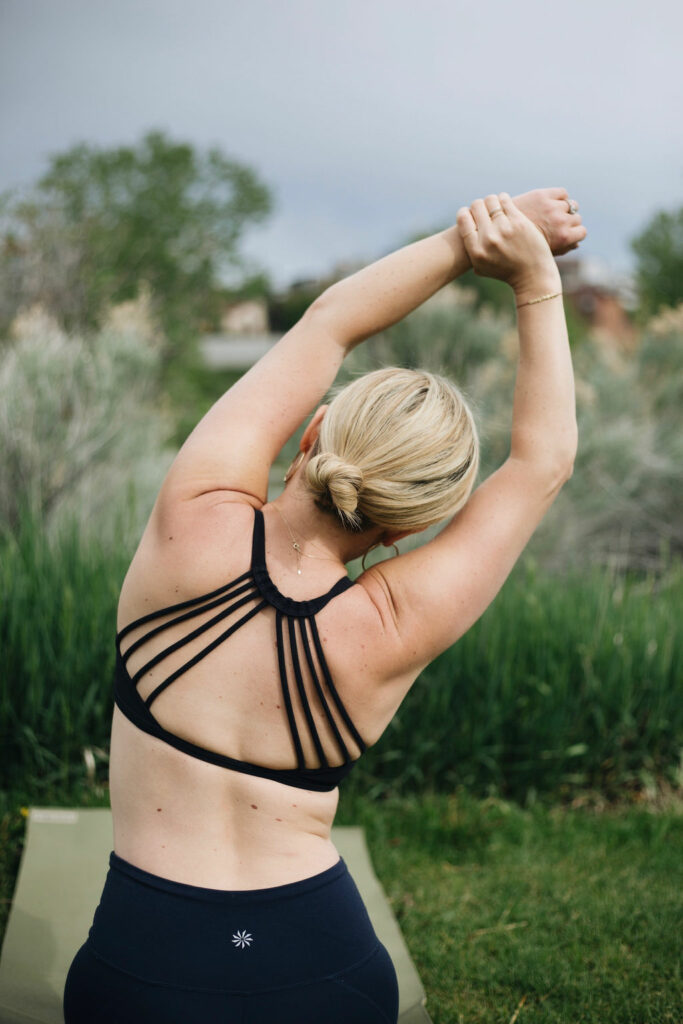
WHY IS SKIN HEALTH IMPORTANT?
We all know our skin is important. It holds everything in, but it also plays a crucial role in providing an airtight, watertight, and flexible barrier—between the outside world and our internal systems. As our largest (external) organ, it’s a defense against toxins and environmental hazards. It also regulates our body temperature and aids in vitamin production. The importance of keeping your skin healthy can’t be overemphasized.
COMMON SKIN Culprits
Damage to our skin comes from both external factors and internal sources. These sources cause oxidative damage to skin cells. In turn, this leads to accelerated skin aging, like loss of elasticity.
External skin culprits
External sources are things like too much sun exposure (we do need some sun, though!), pollution, chemical-laden beauty products, and smoke. While we can’t stop the natural aging process—or rid ourselves completely of external sources—we can nourish and fortify our skin from the inside out.
Internal skin culprits
Internal sources include eating an abundance of inflammatory oils, ultra-processed foods, and sugar. Drinking too much alcohol, stress, and poor quality sleep also increase oxidative damage. Luckily, antioxidants, healthy fats, protein, and hydration can help counteract the things that accelerate the aging process.
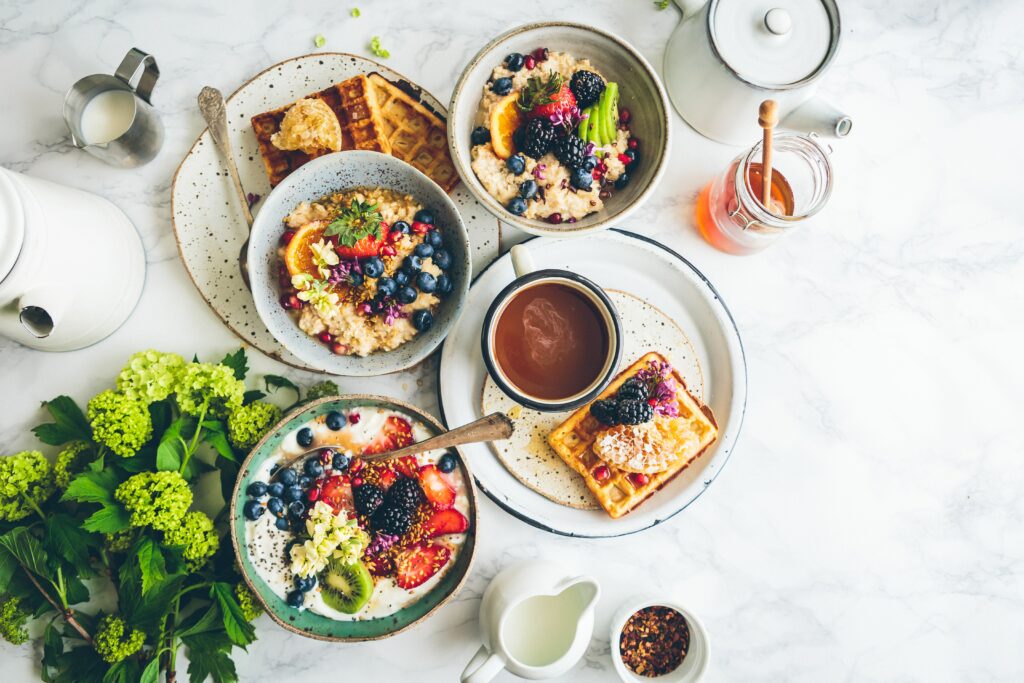
Nutrition’s Impact on skin
First and foremost, wrinkles, under-eye circles, and acne can result from a variety of things (not just food!). And as we know, aging is inevitable. Certain changes to skin are simply beyond our control. However, there are occasions where skin woes are caused by things in your control—including your diet. Generally speaking, foods with inflammatory fats, refined carbohydrates, preservatives, and sugar can cause a rise in insulin levels. When insulin is high, it alters other hormones that can affect the skin. Hello, inflammation, acne breakouts and premature aging.
Here’s a helpful list of foods that don’t spike insulin levels!
Can improving your diet change your skin?
A resounding yes. However, we are all bio-individuals. Your wrinkles, decrease in elasticity, dryness, and breakout triggers might be very different from your coworker, best friend, or sibling. Simply observing how your skin reacts to certain foods is key.
ACNE
Certain foods can promote inflammation throughout the body, thus triggering acne outbreaks. Interestingly, a relatively new study found a correlation between the chances of having acne and the consumption of the following: high-fat foods (including conventional milk and meat), processed sugar, and sugary beverages.
MOISTURE LEVELS
Drinking filtered water is one of the healthiest habits you can establish for your skin (and your entire body). When you drink water throughout the day, you are providing your inner organs and your skin with moisture that has been lost through sweat and other natural processes.
WRINKLES
Did you know that healthy fats (which keep blood sugar stable) can reduce the premature skins of wrinkles? Healthy fats are critical for keeping skin hydrated and plump. Along with high-quality protein, you can help your skin’s collagen production. And by increasing your skin’s collagen production, your skin will be smoother and suppler.
MELANOMA
A diet rich in healthy fats can also help prevent contracting melanoma. Heart-healthy diets, complete with fatty fish, citrus, antioxidant-rich berries, leafy greens, and healthy fats have been found to protect your skin from melanoma.
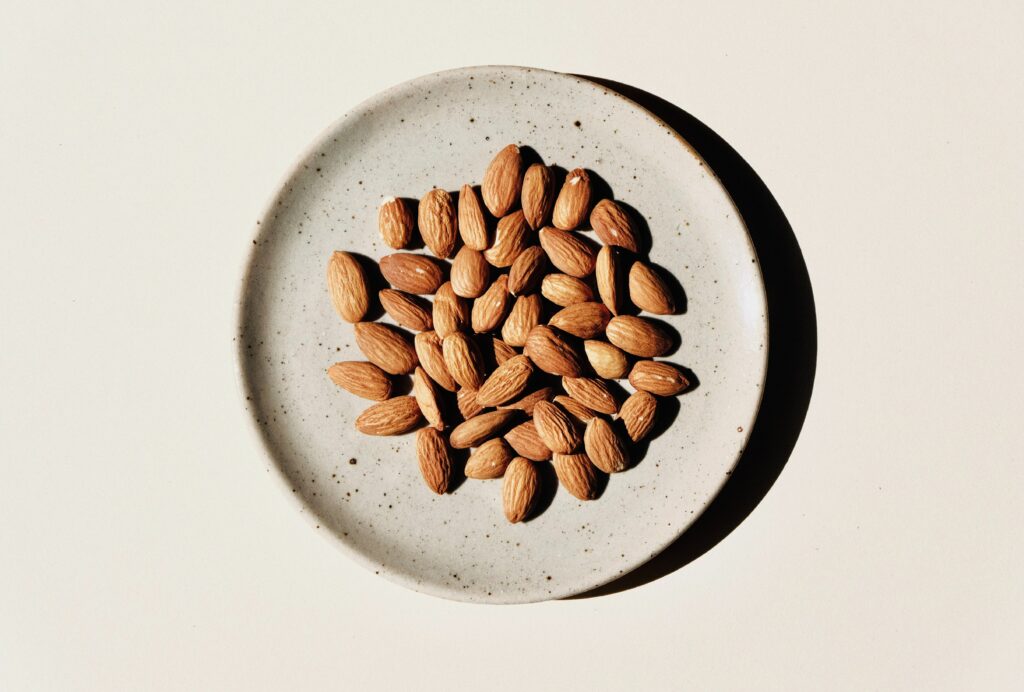
DEFEND YOUR SKIN WITH ANTIOXIDANTS
The benefits of antioxidants are endless—especially when it comes to skin health. Antioxidants reduce or minimize low-grade inflammation, thus improving energy, cognitive function, hormone health, and of course, skin health. In some cases, they can reverse chronic illness and disease. Antioxidant-rich foods, like blueberries, are packed with vitamins and minerals, nourishing your body on a cellular level. Said differently: antioxidants help defend your skin’s health. Along with healthy fats, they are our best defense against oxidative stress.
Healthy Fats For Healthy Skin
Speaking of healthy fats, look no further than omega-3 fatty acids. You’ll find them in certain foods, as well as in dietary supplements—like fish oil. Omega-3 fatty acids are a family of polyunsaturated fats. They’re associated with several health benefits, like reduced risk of inflammatory diseases and depression. These fats are also essential for skin health. Natural sources of omega-3 fatty acids include fish oil, fatty fish, flaxseed oil, and walnuts.
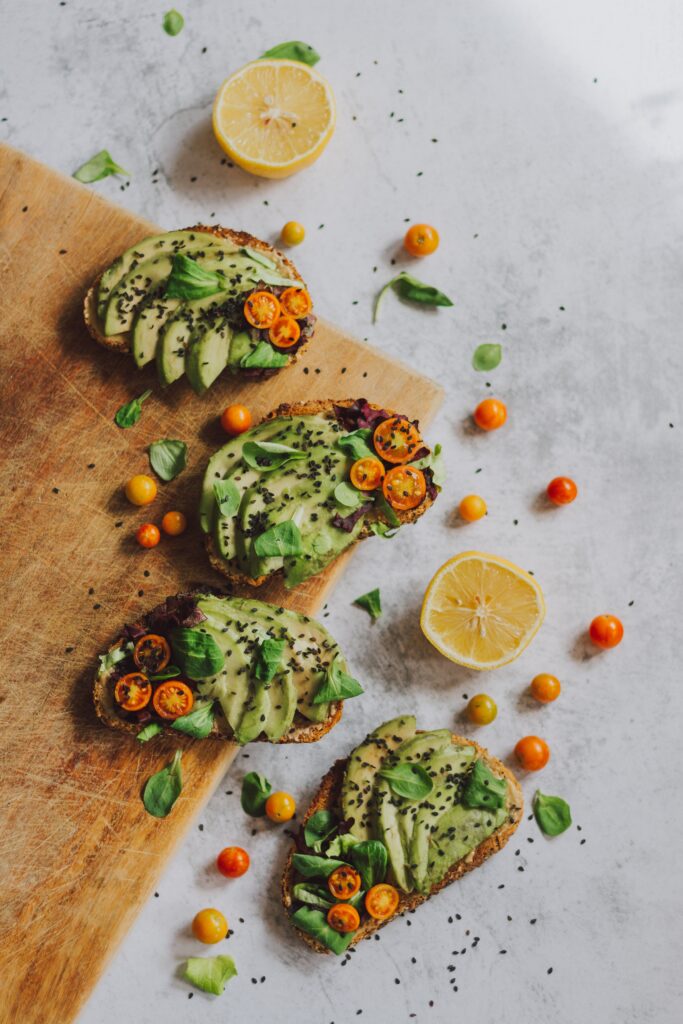
20 FOODS THAT IMPROVE SKIN HEALTH
Eating a diet rich in antioxidants, omega-3 fatty acids, fiber-rich vegetables, and protein can dramatically improve your skin. Spices count as well—turmeric, ginger, and cinnamon. If you’re not sure where to begin, start by adding color. Aim for 3-4 colors on your plate, per meal. For example: eggs (or tempeh) scrambled in olive oil with chopped bell pepper, mushrooms, and arugula. Below are some of the best food choices for healthy skin. And, here are helpful cookbooks to get you started!
ALMONDS
Many nuts, especially almonds, are a great source of vitamin E. Vitamin E can help repair skin tissue, retain skin moisture, and protect skin from damaging UV rays. Walnuts, too, can help strengthen skin cell membranes, protect against sun damage, and give skin a beautiful glow by preserving its natural oil barrier.
AVOCADO
As mentioned, omega-3 fatty acids are key. Aim for a varied diet of wild-caught salmon, walnuts, hemp hearts, chia seeds, ground flaxseed, and avocados. The high content of vitamin A in avocados can help shed dead skin cells, encouraging glowing skin. Their carotenoid content may also assist in blocking toxins and damage from the sun’s rays and also help to protect against skin cancers.
BELL PEPPERS
Bell peppers are high in vitamin C and antioxidants that have powerful anti-inflammatory effects. They also provide the antioxidant quercetin, which may reduce oxidative damage.
BERRIES
From strawberries to blueberries, berries are an incredible source of antioxidants. They contain antioxidants called anthocyanins, compounds that may have effects on reducing the risk of diseases.
BRAZIL NUTS
Two Brazil nuts (per day) contain your daily dose of selenium! Selenium aids in the production of glutathione, which repairs cell damage. It also slows down the skin’s aging process. Selenium also supports the elasticity of our tissues, protects against sunburn, and fights blemishes.
BONE BROTH
Bone broth is very nourishing food for healing intestinal permeability. In other words, it helps the gut lining. Bone broth contains collagen, which supports the gut lining and reduces inflammation.
Chia And Flaxseeds
Chia and flaxseeds are both high in omega-3 fatty acids, which are proven inflammation fighters. Best of all, they’re super easy to incorporate. You can add a couple of tablespoon of ground flaxseeds or chia seeds to your cereal, oatmeal, or yogurt, baked goods, or smoothies. Otherwise, start seed cycling!
COCONUT OIL
Coconut oil is a great way to get those beauty-boosting essential fats. Coconut oil is also easily absorbable, making it a great source of quick energy. Last but not least, coconut oil is anti-viral, anti-microbial, and anti-fungal.
Cruciferous veggies
In addition to leafy greens, cruciferous veggies (like broccoli and cauliflower) are an anti-inflammatory, anti-aging powerhouse. They’re packed with vitamins C and K, antioxidants, fiber, folate, and more. Your body needs vitamin C for the production of collagen, the main protein in the skin that gives it strength and elasticity.
EXTRA-VIRGIN OLIVE OIL
Olives—and extra-virgin olive oil, in particular—are practically a superfood. They’re also one of the best-kept beauty secrets! Olives are a rich source of vitamins A and E, both of which protect the oils on the surface of your skin from damage. Olives also help strengthen connective tissues, improving skin tone and protecting against UV radiation.
Kefir
Probiotic foods are key for skin health. An unbalanced gut can show on the outside, causing premature aging. In addition to consuming kefir (I like to add it to a smoothie), it’s effective when used externally, too. Kefir helps get rid of dead skin cells, restores the balance of beneficial bacterias on your skin, and stimulates the production of collagen, an anti-aging agent.
Leafy Greens
Dark leafy vegetables—such as spinach, kale, cilantro, parsley, and broccoli sprouts—are skin-loving superfoods. They work to rid the skin of dullness.
MUSHROOMS
Mushrooms have been reported to contain antioxidant properties. These antioxidant properties enable them to neutralize free radicals. In fact, research shows that shiitake mushrooms may boost your immune system.
Papaya
The wide range of antioxidants in papaya helps to fight free radical damage and may delay signs of aging. Papaya also contains an enzyme called papain, which provides additional anti-aging benefits. It works as one of nature’s best anti-inflammatory agents. It comes as no surprise that papaya is also found in many exfoliating products.
Pomegranates
Like blueberries, strawberries, and kiwi fruit, pomegranates have been used for centuries as a healing medicinal fruit. High in vitamin C and a variety of potent antioxidants, pomegranates may protect our body from free radical damage and reduce levels of inflammation in our system.
SALMON
Salmon, sardines, and mackerel are fatty fish with omega-3s. All of which have shown potent anti-inflammatory properties. EPA and DHA, both present in these fish, reduce inflammation that can lead to chronic illness and disease.
SUNFLOWER SEEDS
Sunflower seeds are rich in vitamin E, which keeps moisture in the skin. It also protects the oils in the skin’s moisture barrier. These seeds soothe dry skin and can minimize the appearance of wrinkles (when applied topically). Vitamin E also reduces the effects of sun exposure on the skin. That said, seeds, in general, are wonderful for skin health. More on how diet affects your skin, here.
Sweet Potatoes
This comforting root vegetable is a great source of vitamins C and E—both of which may protect our skin from harmful free radicals and keep our complexion radiant. Sweet potatoes also stimulate the production of collagen and help minimize wrinkles.
Watercress
This nutrient-dense and hydrating green is a powerhouse vegetable. It packs several important nutrients but is extremely low in calories. It contains a plethora of antioxidants and minerals to support your skin (and help with reversing sun damage!).
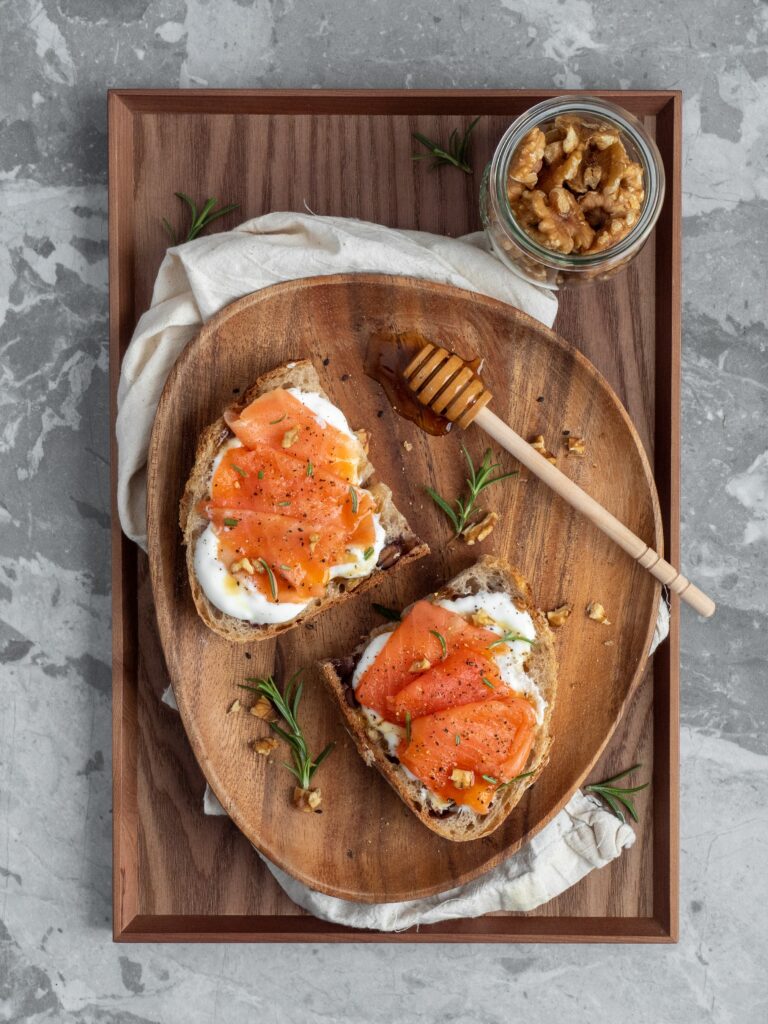
This post contains affiliate links. Thank you for supporting Wellness with Edie! This article is for informational purposes only. It is not, nor is it intended to be, a substitute for professional medical advice, diagnosis, or treatment and we recommend that you always consult with your healthcare provider.



Leave a Reply